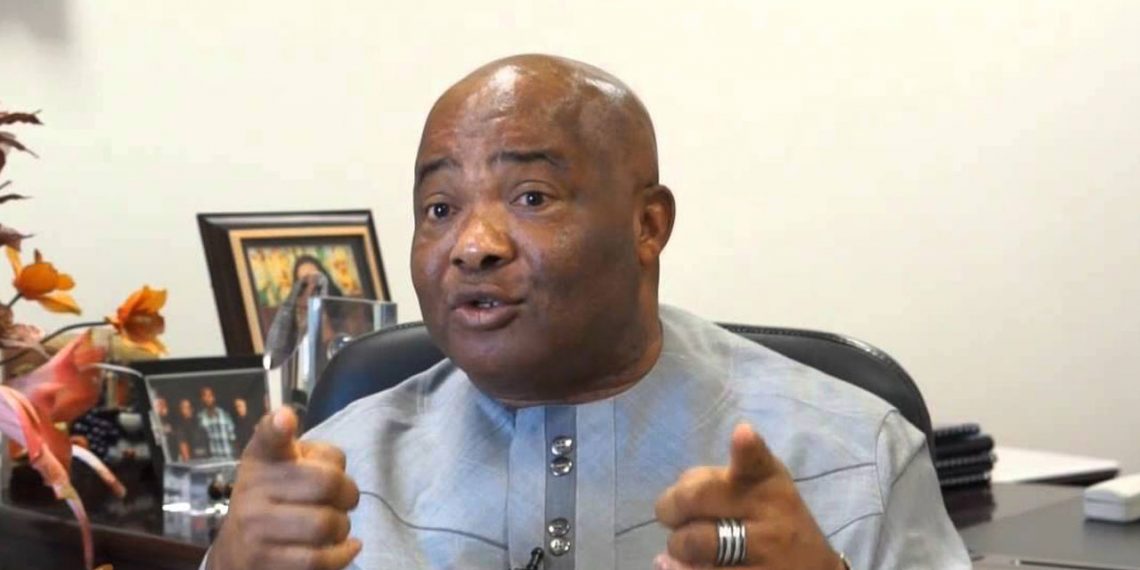100 DAYS IN OFFICE: Why Governor Uzodinma deserves thumbs-up (1)

By Collins Ughalaa
We can hardly blame those who are already marking Governor Hope Uzodimma’s script. That is the nature of our politics. The clock begins ticking from the day you were sworn in. Some governors, unaware that the countdown had begun, embark on honeymoon. But not many governors like the luxury, even when they have the time. Then, talk of a governor like Senator Hope Uzodimma who did not have the time for such wild-goose chasing luxury. He was declared the Governor of Imo State by the Supreme Court on Tuesday, January 14, 2020, and on Wednesday, January 15, 2020, he was sworn in. The clock started ticking from that Wednesday, and his countdown to the 100 Days in Office began.
We had on September 11, 2019 posited that the 100 Days in Office celebration is an unnecessary necessity. We had said specifically that “Though the 100 Days in Office seems to have become part of the measuring stick in our polity, some people do not subscribe to it. For our part we think it is unfair to begin to judge or assess a student in his 100 days in school when he has six years to stay in school and eventually write his Common Entrance and Final Six examinations”.
Without running against a seemingly entrenched political culture, we may wish to consider a governor facing enormous challenges but possessing the determination to serve his people. Let us imagine once more a governor that is determined to spread prosperity among his people. Let us look at Governor Hope Uzodimma.
For several years now the payment of salaries and pensions has been a burning issue. They have even become emotional issues and ready tool for blackmail. Some people think that the payment of salaries and pension is intrinsically tied to the development of the state. The proponents of this ideology behave as if the payment of salaries and pensions is the only reason a governor was elected. They want the people to believe that little and routine gestures like the payment of salaries and pensions is the major measuring stick for any governor elected by the vast majority of the people. These vast majority of the people who neither take salaries not receive pensions also want the governor they elected to address their needs. They won’t take the payment of salaries and pensions as any excuse from the governor.
Those who believe in the Prosperity Government nevertheless consider the payment of salaries and pensions as one of the ways of spreading prosperity among the people. They also believe in the old saying that a worker deserves his wages. But payment of salaries and pensions is just one of the many ways a governor keeps his social contract with the people. Not the only way. Truth be told, the payment of salaries and pensions is so dear to the Prosperity Government. The Governor had demonstrated this when upon assumption of office he promised prompt payment of salaries. He went further to put down his security vote to ensure that the prompt payment of salaries and pensions was not negatively affected by the paucity of funds available to the government.
It would seem that despite the Governor’s promise of prompt payment of salaries and pensions, there are still issues around it. Some people think that no matter what happens the Governor must keep to his promise. They believe that the Governor’s promise became a social contract once uttered. This may be plausible. However, what those who make issues with the payment of salaries seem not to agree with, is that there are issues around the salary structure in the state. It is therefore in the best interest of the state that these people appreciate the fact the Governor has a duty not to pour our commonwealth into a certain bottomless pit but to clean up whatever mess he sees around the matter.
Resolving the salary and pensions quagmire is a duty the Governor must perform, because, our recent history shows that previous governments had also pointed to this same direction. The recent revelations from the Prosperity Government suggest that the salary and pension quagmire was not completely resolved by the previous governments.
The salary and pension debate is akin to a man who promised his family that he would be in Abuja by 7pm on a certain day. On the said day the man sets out for Abuja, but on his way his vehicle develops a fault. Should the man abandon his vehicle on the road and get to Abuja by any means, to prove to his family that he is a man of his words? Or, should the man take his time and fix the vehicle and continue his journey to Abuja? We might also liken the matter to a man who begins erecting a good building for himself. Along the line he sees a serious defect that could lead to the collapse of the house upon completion. An expert suggests that the defective part of the building should be pulled down and be rebuilt. Should the owner of the building listen to the expert or do as he wanted and have the building collapse in the end?
On Friday, April 17, 2020, the state government revealed that the state had lost about N1billion to salary scam and ghost workers. The government said that about 1,000 ghost workers were found in its workforce. The Commissioner for Finance, Hon. Chuk Chukuemeka, made the revelation after a crucial meeting the Governor had with Commissioners, Permanent Secretaries and Heads of Parastatals in the state on Friday. He was supported by the Commissioner for Information, Hon. Declan Mbadiwe Emelumba, who added that the state lost the huge revenue due to double entries in salary payroll, use of fictitious names and additional Bank Verification Numbers (BVN). Emelumba also added that some of the 1,000 ghost workers have been earning salaries and pensions at the same time.
Other government sources lament the disparity in salary volume among the local governments. It is only miraculous that local governments with more workers, such as Owerri Municipal, pay lesser in salary and pension. It is outright wickedness that some persons retire on level 7 but receive pensions as people who retired on level 14. It is dumbfounding that a certain local government has about 77 drivers with 5 vehicles only. Should the Governor pretend as if these problems don’t exist and go ahead and pay salaries and pensions? Would it not amount to abdication of duty if the Governor overlooked these problems?
We recall that while the last administration was undertaking its pension verification programme the pensioners in the state were not paid. While we commend the state government for ensuring that salaries and pensions are paid to those who genuinely earned it, we enjoin Imo people to be patient as the government fixes the problems. The Governor cannot pretend that the problems don’t exist.
The Governor has been commended for continuing with some of the projects initiated by his predecessor, especially roads. It takes courage and discipline for a governor to continue with the projects of his predecessor. Those who think that a governor is bereft of ideas by continuing with the projects he met are playing to the gallery. It is the people that suffer when a governor decides to abandon the projects of his predecessor.
To continue with the projects of his predecessor is to render classic service to the people instead of fighting political wars. Lagos and Akwa-Ibom states serve as good examples of states where the people are happy because the governors continued with the projects of their predecessors.
In Imo State, we have suffered from successive governors abandoning the projects of their predecessors. Former Governor Ikedi Ohakim had nice projects he bequeathed to his successor, now Senator Rochas Okorocha, in 2011. The projects included over 2,000 water schemes. This project alone provided water to people everywhere in the state. But it was discontinued with by his successor. For eight years all the taps in the state were dry. The Oguta Wonder Lake Resort and Conference Centre was jettisoned. What of the road projects: the inner ring road, the outer ring road and the outer-outer ring road? What of the boulevards?
The new government house project was also cancelled in 2011. Imo people have not forgotten the sad stories of how the new government house land was balkanize and allocated to interested persons instead.
On the other hand, Imo people now make use of the Ahiajoku Conference Centre which was almost completed by the time Ohakim left office in 2011. His successor, Senator Rochas Okorocha, did not abandon it. Same goes with the flyover project. Though the flyovers need repair works, Okorocha did not abandon it. Today, Imo State has two flyovers.
That is how government functions: it is a continuum. Accordingly, the Holy Bible admonishes in 1 Corinthians 3:7, 8: “So neither the one who plants nor the one who waters is anything, but only God, who makes things grow. [For] the one who plants and the one who waters have one purpose, and they will each be rewarded according to their own labor”.







